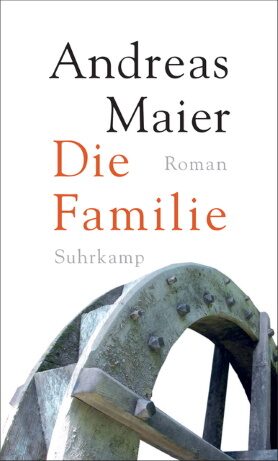Andreas Maier
Die Familie
[The Family]
- Suhrkamp Verlag
- Berlin 2019
- ISBN 978-3-518-42862-7
- 166 Pages
- Publisher’s contact details
Sample translations
IN THE HOUSE OF THE SILENT CHILDREN
At the same time, it marks a break in the narrative: Investigating his family’s past, the author has come across incongruities that compel him to deconstruct the myth of his identity and look back on everything reported so far from a different perspective. In this way, this novel, even more so than the preceding ones, gains an independence to which Andreas Maier attaches great importance: Since he considers the traditional novel form outdated, he aims to give his books new, autonomous structures that make it possible to read them individually, outside of the cyclical context, without further ado.
Despite the dryly ironic tone that characterizes Maier’s narration, his Heimat saga has up to now had distinctly idyllic features. The cracks running through West German society during the years he grew up and shaking its foundations, triggered by the belatedly exposed lies and repressions of the “economic miracle” generation, seemed to touch the narrator’s respectable home among the fruit trees of the Hessian provinces at most from a distance. Now it is revealed to him by chance that his family was deeply involved in the machinations of the National Socialists and that their prosperity was based on the expropriation and expulsion of Jewish fellow citizens. And suddenly he sees many things in a new light, things he had perceived as a child and adolescent with a certain unease and yet could not pin down: speechlessness and the litany-like repetition of clichés, quarrels with relatives, inheritance disputes, the dubious behavior of his father, who was a lawyer and conservative local politician, the hysterical reactions of his mother, the rebellion of his older brother. And the demolition of a landmarked mill on their property, which in the book serves as a powerful metaphor for the destruction of illusions.
When his world of origin is subsequently thrown out of joint, the narrator, not without melancholy, finds himself and his project disenchanted too: “My beautiful Wetterau! All this time it could be literature. It could bloom, give off scents, float, fly…” He must recognize: “We are the children of the silent children.” His alter ego, the author Andreas Maier, notes: “All this time I’ve been writing postwar literature without realizing it.” It’s a postwar literature likely to reflect common experiences of his generation in many ways. And precisely by dint of its laconic sobriety, often intermingled with comedy, it once again throws an explosive charge into the German silence so persistently handed down.
Translated by Ross Benjamin

By Kristina Maidt-Zinke
Kristina Maidt-Zinke is a book and music critic at the Süddeutsche Zeitung and also writes reviews for Die Zeit.
Publisher's Summary
Andreas Maier describes the self-destruction of the familial idyll in a highly comical and profound way. Where the ancestors used to drink the family’s own apple cider, most comfortably it seems, surrounded by fruit trees and chickens and goats, the later generations have to deal with inheritances, a huge plot of land, a malicious monument preservation office, excavator operator in tow, with weird children and chaotic grandchildren constantly – or so it seems. Everybody appears infected with a destructive virus until the narrator, born in 1967, finally realizes as a representative of his entire generation: »We are the children of the children of silence.« The understanding of his own family history begins in front of a tombstone, far beyond the familiar city.
(Text: Suhrkamp Verlag)
